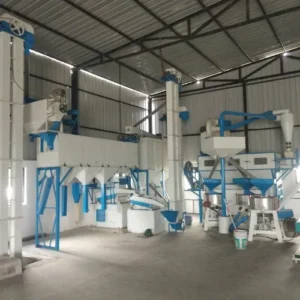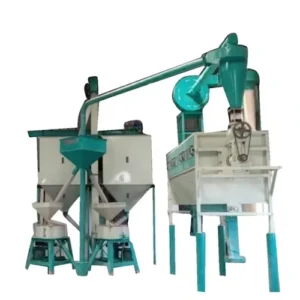Flour Mill
-
75 HP Mild Steel Fully Automatic Flour Mill Plant
Capacity 1000 kg/hrMotor Power 75 HPOperation Mode Automatic₹1,450,000.0075 HP Mild Steel Fully Automatic Flour Mill Plant
₹1,450,000.00 -
Automatic Flour Mill, 30 HP
Operation Mode AutomaticPower Rating 30 HPCertification MSME₹800,000.00Automatic Flour Mill, 30 HP
₹800,000.00 -
37hp Automatic Flour Mill Plant
Capacity 250kg/hMotor Power 37hpPower Consumption 12kW₹730,000.0037hp Automatic Flour Mill Plant
₹730,000.00 -
Industrial Wheat Flour Mill Plant
Operation Mode AutomaticMaterial of Construction Mild SteelElectricity Connection Three Phase₹1,006,720.00Industrial Wheat Flour Mill Plant
₹1,006,720.00
Flour Mill – A Complete Guide to Features, Types, Prices, and Buying Guide
Introduction to Flour Mill
A flour mill is a machine used for grinding grains into flour. It is an essential piece of equipment for households, small businesses, and large-scale industries that process wheat, rice, corn, and other grains into fine powder. The demand for high-quality flour is increasing as people prefer freshly ground flour over packaged alternatives. Investing in a flour mill, whether for home use or commercial purposes, can be a profitable decision.
In this guide, we will cover everything about flour mills, including their types, features, working process, benefits, price range, and business opportunities. This will help you make an informed purchase and understand how to set up a successful flour milling business.
Types of Flour Mills
Flour mills come in different types based on their grinding mechanism, size, and level of automation. Here are the most common types:
1. Domestic Flour Mill (Atta Chakki)
-
Designed for household use.
-
Compact and easy to operate.
-
Can grind small quantities of wheat, rice, millet, and pulses.
-
Available in electric and manual versions.
2. Commercial Flour Mill
-
Used for bulk grinding in small businesses and commercial setups.
-
Higher grinding capacity than domestic mills.
-
Can process a variety of grains and pulses.
-
Requires more space and power.
3. Industrial Flour Mill
-
Large-scale milling machines for industrial production.
-
High-speed operation with advanced automation.
-
Used in flour manufacturing plants.
-
Can produce large quantities of refined and whole wheat flour.
4. Stone Flour Mill
-
Uses stone grinding technology to retain nutrients.
-
Produces traditional and organic flour.
-
Slow grinding process ensures better taste and texture.
-
Preferred by organic food businesses.
5. Roller Flour Mill
-
Uses steel rollers instead of stones for fine grinding.
-
Produces refined flour (Maida) and semolina (Sooji).
-
High-speed operation for commercial and industrial use.
Key Features of Flour Mills
1. High Grinding Efficiency
-
Advanced grinding technology ensures faster and finer flour production.
2. Multiple Grinding Settings
-
Adjustable grinding modes for fine, medium, and coarse flour.
3. Durable and Long-Lasting Design
-
Made with stainless steel or cast iron for extended durability.
4. Energy Efficient
-
Low power consumption, making it cost-effective.
5. Safety Features
-
Overload protection, child lock, and auto shut-off functions in modern models.
6. Low Noise and Dust-Free Operation
-
Advanced models have noise-reducing motors and dust collection systems.
7. Compact and Space-Saving Design
-
Available in different sizes to fit home kitchens and commercial spaces.
8. Versatile Grinding Capability
-
Can grind wheat, rice, maize, pulses, and spices.
9. Easy Maintenance
-
Detachable grinding plates for easy cleaning and maintenance.
How a Flour Mill Works
The process of milling flour involves several steps:
-
Cleaning: The grains are cleaned to remove dust, stones, and impurities.
-
Grinding: The cleaned grains are fed into the mill, where they are ground into flour.
-
Sieving: The flour is passed through sieves to remove coarse particles.
-
Packaging: The final product is packed for storage or sale.
Flour Mill Prices in India
The cost of a flour mill depends on its type, size, brand, and features. Below is an approximate price range:
-
Domestic Flour Mill: ₹5,000 – ₹25,000
-
Commercial Flour Mill: ₹25,000 – ₹2,50,000
-
Industrial Flour Mill: ₹2,50,000 – ₹50,00,000
-
Stone Flour Mill: ₹10,000 – ₹1,00,000
-
Roller Flour Mill: ₹5,00,000 – ₹1,00,00,000
(Note: Prices may vary based on location and brand.)
How to Start a Flour Mill Business?
1. Business Planning
-
Identify the market demand and competition.
-
Choose a niche (wheat flour, multigrain flour, organic flour, etc.).
-
Estimate investment costs and expected profits.
2. Legal Registration
-
Register your business under MSME or UDYAM.
-
Get a FSSAI license for food safety compliance.
-
Obtain GST registration for taxation purposes.
3. Selecting the Right Flour Mill
-
Choose a flour mill based on production capacity and budget.
-
Ensure it meets quality standards and safety regulations.
4. Raw Material Sourcing
-
Select high-quality wheat or grains for milling.
-
Establish reliable suppliers for steady production.
5. Production & Quality Control
-
Maintain high hygiene standards.
-
Regularly test flour quality to ensure consistency.
6. Marketing & Sales Strategy
-
Sell through retail stores, wholesalers, supermarkets, and online platforms.
-
Create a website and social media presence to attract customers.
-
Offer bulk discounts and promotional offers.
Profit Margin in Flour Mill Business
-
Cost of wheat per kg: ₹20-₹30
-
Processing cost per kg: ₹2-₹5
-
Selling price per kg: ₹40-₹60
-
Profit per kg: ₹10-₹25
With a production of 1000 kg per day, the profit can be ₹10,000-₹25,000 daily. This means a monthly profit of ₹3,00,000 to ₹7,50,000.
Best Brands & Manufacturers of Flour Mills in India
-
Natraj Flour Mill – Leading brand for domestic mills.
-
Milcent Flour Mill – Known for high-quality household mills.
-
Laxmi Flour Mill – Popular for commercial and industrial mills.
-
Reindeer Machinery – Offers heavy-duty flour mills.
-
Navdeep Flour Mill – Trusted brand for durable mills.
Conclusion
A flour mill is an excellent investment for households, small businesses, and industrial setups. Whether you need a domestic atta chakki or a large-scale commercial flour mill, choosing the right machine is crucial for success. With the growing demand for fresh and organic flour, starting a flour milling business can be highly profitable.
🚀 Ready to start your flour milling business? Choose the best flour mill today and begin your journey towards success! 🚀




